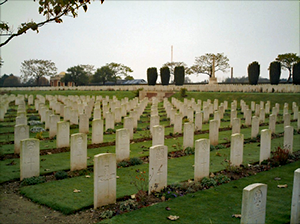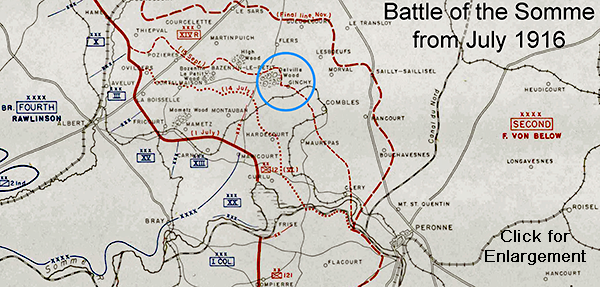First World War Project
Dennis Joseph POWNALL (of Oare)
b. Q3, 1892 Sergeant, Service Number 899 |

We have added this account even though the name does not appear on the Oare Memorial. The reason being that his wife Daisy Violet Pownall (née Jones) lived in No.2 Pheasant Cottages, Oare, during and after the war and it was to this and Luddenham addresses that all official communications, effects and medals went to his widow.
Daisy (b.1891, Five Oaks Green) appears as a Laundress living at home in Westgate in the 1911 census. Her father was a General Labourer.
Denis was born to John and Catherine/Kathlene Pownall of 16 Warner Street, Garston, Liverpool. At the time of his enlistment he was described as 19 years and 11 months of age, 5 feet 6½ inches tall, chest measuring 34¾" (expansion 2½"). Good eyesight and physical development. He appeared to have scarring from burns on one of his forearms.
He first attested on 21st May 1912 to join the 1st Battalion of the 3rd West Lancashire Brigade (Royal Field Artillery) for a four-year period.
How the connection between Liverpool and Oare became established is not clear but Denis and Daisy married in Faversham in the third quarter of 1915. Denis left one baby son (Denis G(eorge?)), born 16th April 1916 (registered in Milton-next-Sittingbourne).
By the time that war broke out and Denis landed in France, he was assigned to the 13th Battery, 277th (West Lancashire) Brigade of the RFA. The Brigade Diary further records (15th May 1916) the renaming of the Divisional Artillery establishment to change the 13th Battery into "B" Battery.
Whilst serving at the front, Denis was "promoted sergeant in the field" on 16th May 1916. This was the day after the reorganisation of the artillery units on 15th May when he found himself in the new "B" Battery of 277th (West Lancs) Brigade RFA.
On learning of her husband's death, Daisy asked for his effects to be forwarded to her at Four Oaks Cottages, Bysing Wood Road, Luddenham, Faversham, Kent. On 2nd February 1917, further correspondence gives Daisy as living in "Nash Cottage", Luddenham.
While Denis served overseas, Daisy received the usual "separation allowance", which was replaced by a Military pension of 16/- per week from 26th February 1917. His effects amounted to £5.5s.0d. and after the war, a War Gratuity of £11.10s.0d. was paid to Daisy. [See Appendix 2]
The Graves Commission records that Daisy paid for an inscription on his grave marker to read:
UNTIL THE DAY BREAKS
AND THE SHADOWS FLEE AWAY,
FROM HIS LOVING WIFE
& LITTLE SON.
Medals: Denis Joseph Pownall was posthumously awarded the 1914-15 Star, the British War Medal and the Victory Medal. [See Appendix 1]
Circumstances of Denis Pownall's death
On 3rd January 1916, the 13th Battery and one section 14th Lancs Battery left WIZERNES to FROUCOURT ahead of three weeks routine training. By mid-February, the Brigade had moved to BEAUMETZ to take over the French artillery position.
The monthly casualty figures for the 277th Brigade whilst in or moving up to the BEAUMETZ Sector (January to July 1916) were dominated by sickness, scabies and injury rather than "wounded". August, moved now to BRICK POINT, BRAY SUR SOMME, where the number of wounded increased significantly while other figures remained stable.
| Sent to Hospital January to July | Sent to Hospital August | |
| sick | 19.0 | 15.0 |
| scabies | 4.4 | 4.0 |
| wounded | 1.9 | 32.0 |
| injured | 2.7 | 3.0 |
Note: "Injured" was a penalty of working with heavy guns, weighty shells and general high-impact manoeuvring over difficult ground.
The 277th (West Lancs) Brigade RFA Batteries were thrown into the thick of the First Battle of the Somme that had begun on 1st July. On Early in the morning of 30th July, the Brigade marched with the Divisional Artillery to camping area in TAILLES WOOD and BRAY SUR SOMME. The billets for "B" Battery (in which Denis served) were described as "satisfactory". The weather for the first three weeks of August was "very fine and warm".
The intensity of the battle meant that casualties arose from the first day (1st August) of moving into position when one NCO and 2nd Lieutenant H.Backby were killed. Another officer was evacuated sick. The Forward Observation Officer was established at ARROW HEAD COPSE. All units registered their ranges (4th August). The same day, "B" Battery command was taken over by Captain G.E. Castle.
It is tricky trying to work out which day Denis was shot because gas gangrene generally carried off those with open wounds in one to four days (but theoretically could lead to death within 8 hours or several weeks after injury). Assuming that the general pattern was followed, that would place the original injury between 12th and 15th August. Determining the date is not helped by common practice of not naming "O.R." casualties.
During the first week of August, the artillery units delivered an intensive barrage onto GUILLEMONT. This was met by heavy counter-battery shelling all night on 6th August.
7th August saw "Chinese Attack" Orders put in hand. "Chinese Attack" refers to a faked attack based on very intense (apparently) softening barrages that signalled an impending infantry attack. The infantry attack would not happen and the enemy would emerge from their hardened positions when the barrage would be resumed in the hope of inflicting serious casualties.
The ("Chinese") bombardment of GUILLEMONT opened at 4.20am on 8th August. Renewed at 4.20am the following day (9th) when their own batteries were heavily bombarded.
On 10th August, the 277th Batteries delivered their barrage onto the road between LEUZE WOOD and BOULEAU WOOD. By 11 pm, "B" Battery had a gun knocked out.
During 11th August, the artillery barrage was renewed later at midday and received German artillery fire in answer. 1 O.R. killed and 2 wounded. This could easily have been the scene of Denis's injury, but this is speculation.
"C" Battery took several casualties on 12th August. But noting is said of Other Ranks (O.R.) on that day. The next casualty noted came on 14th August - one O.R. in "A" Brigade.
On 16th August, the day Denis died in hospital, "A" Battery suffered 2 O.R. dead and 2 O.R. wounded.
Denis Pownall's Brigade was part of the major offensive along the Somme and around Ginchy, when he was injured - he later died of gas gangrene. The report of his death was dated 18.8.16 from 1st South African General Hospital - "Died of wounds. Gun Shot Wound to thigh with Gas Gangrene. Died 16.8.16". During World War 1, gas gangrene was experienced with 6% of Open Fractures and 1% of open wounds.


 World War 1 Pages
World War 1 Pages